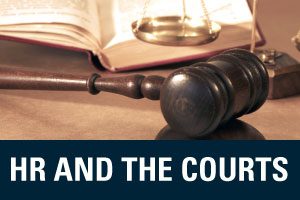HR and the Courts – August 2022
Each month, CUPA-HR General Counsel Ira Shepard provides an overview of several labor and employment law cases and regulatory actions with implications for the higher ed workplace. Here’s the latest from Ira.
EEOC Reaches Settlement Banning Employer Collection of Family COVID-19 Testing Results — GINA Implications
In a case involving a dermatology medical practice in Florida, the EEOC reached a settlement of the charge it brought against the employer medical. The case alleged that the employer violated the Genetic Information Nondiscrimination Act of 2008 (GINA) when it collected family COVID-19 testing results of its employees. Title II of GINA bans employers from collecting an employee’s genetic testing results and a worker’s family medical history.
However, the EEOC also issued guidance stating that an employer can still ask its employees if they had contact with anyone who has been diagnosed with COVID-19 or who has had symptoms of COVID-19. Nonetheless GINA prohibits employers from inquiring directly and specifically as to the COVID-19 status of an employee’s family members.
The EEOC also recently issued guidance on July 12, 2022, that, going forward, before requiring employees to submit to COVID-19 testing, employers should consider whether current pandemic circumstances and individual workplace circumstances justify viral screening of employees. Essentially the EEOC’s position is that before going forward with workplace COVID-19 screening, the employer must demonstrate a “business necessity” based on general pandemic circumstances and individual workplace circumstances.
Federal Court Holds That Discharge Proximity to an Employee’s Filing for Extended FMLA Leave Warrants a Jury Trial Over Retaliatory Discharge Claims
A federal district judge recently ruled that a plaintiff’s claim that her discharge shortly after seeking an extension in FMLA leave to deal with mental health problems was retaliatory warrants a jury trial over FMLA retaliatory discharge allegations and dismissed the employer’s motion for summary judgement. The plaintiff was a human resources manager who allegedly suffered from depression and anxiety. The employer argued that it was entitled to summary judgement because the plaintiff was discharged before the employer made a decision on the FMLA extension request. The judge concluded that gaps and inconsistencies in the employer’s explanation of the reasons for discharge warrant a finding of fact by a jury as to the timing and reason for discharge (Moryn v. G4S Secure Solutions USA, Inc. (2022 BL 222775 Dist Minn. No. 0:21-cv-00123, 6/28/22)).
The plaintiff had requested and received a three-month leave of absence based on the recommendation of her physician for mental health reasons. When the three-month leave concluded, the employee requested an additional month followed by a part-time work schedule that progressively added more days to the job.
Separately the judge dismissed the allegations under Minnesota state discrimination law related to disability discrimination and the allegations that the employer failed to accommodate the plaintiff.
Court of Appeals Rules That a State Agency’s Banning of “Black Lives Matter” Adornments to Employee Uniforms Violates the First Amendment
The U. S. Court of Appeals for the 3rd Circuit (covering Pennsylvania, New Jersey and Delaware) affirmed the decision of a federal trial court, which ruled that a Pennsylvania local transit authority violated the First Amendment guarantee of free speech by prohibiting Black Lives Matter adornments on employees’ uniforms as part of its policy prohibiting political and social adornments on employee uniforms.
The court of appeals also ruled that the Allegheny County Port Authority’s policy revision, which allowed employees to wear only certain masks to make it easier for the authority to enforce its ban on Black Lives Matter messaging, violated the First Amendment. The case challenging the transit authority’s policies was brought by the employees’ union in Amalgamated Transit Union Local 85 v. Port Authority of Allegheny County (3rd Cir. No. 21-1256, 6/29/22 ).
U.S. Supreme Court Rules in Favor of Football Coach’s After-Game Prayer, Concluding His Discharge Violates the First Amendment Free Speech and Religion Provisions
In a long-awaited and controversial decision, the U.S. Supreme Court ruled against a school district firing of a football coach who refused to abandon his long-practiced ritual of kneeling in prayer at the 50-yard line at the conclusion of each football game. In doing so, the Supreme Court overruled the decision of the 9th U.S. Circuit Court of Appeals ruling in favor of the school district. The football coach argued that he had agreed to the school district’s demands that he stop leading prayers with his players, but wanted to continue taking a knee in prayer alone after each game.
Justice Neil Gorsuch concluded that the case was about “three quiet prayers,” and because no student joined in those prayers, the coach was acting as a private citizen, not a school employee or coach. The justice concluded that the coach was not acting within the scope of his activities as a coach and therefore his actions were protected by the First Amendment. The Supreme Court decision was a divided one, 6 to 3 (Kennedy v. Bremerton School District ( US 21-418, 6/27/22 )).
NLRB Reports That Private-Sector Union-Organizing Petitions Have Risen 58% and Unfair Labor-Practice Charges Filed by Employees Have Risen 16% in Fiscal Year 2022
The National Labor Relations Board (NLRB) reported a sharp increase in private-sector union-organizing petitions filed during the first three quarters of fiscal 2022 (October 1-June 30), concluding that union-organizing petitions rose by 58%. The increase in union-organizing petitions has been across the board in the private sector and not limited to high-profile organizing nationwide at Starbucks and Amazon. U.S. workers filed 1,892 organizing petitions in the first three quarters of fiscal 2022 as compared to 1,197 petitions in the first three quarters of fiscal 2021.
The data also show that U.S. workers filed 16% more unfair labor-practice charges against employers during the first three quarters of fiscal 2022. Unfair labor-practice charges at the end of June had increased from 11,451 in fiscal 2021 to 13,105 in fiscal 2022.



